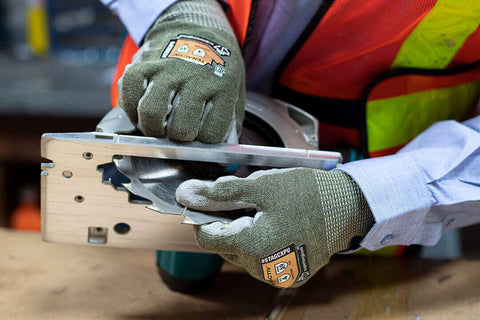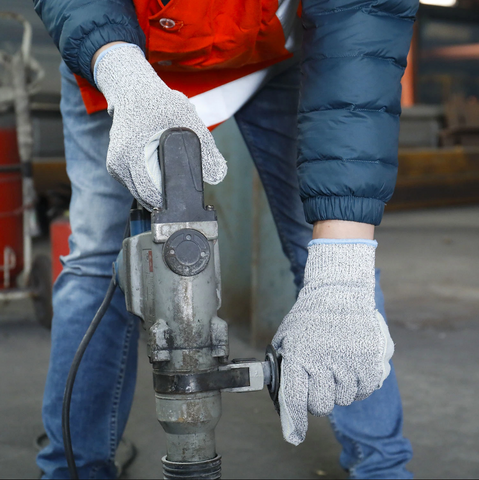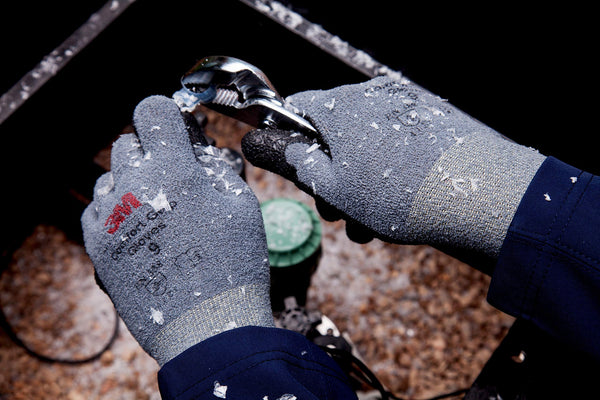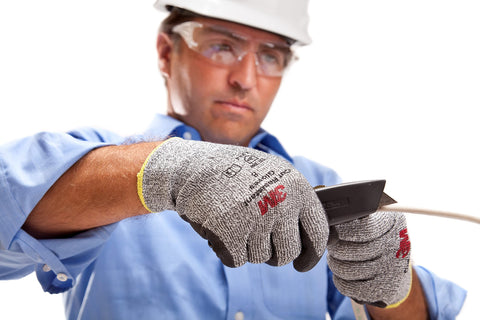The Different Types of Gloves Used in Industry (And Their Uses)
Safety gloves are indispensable in the modern industrial landscape. From the meticulous hands of a surgeon to the rugged grip of a construction worker, protective gloves ensure safety, precision, and comfort. These aren't just barriers; they're tools tailored to enhance performance, reduce fatigue, and prevent potential hazards. As industries evolve, so do the challenges faced by professionals.
Whether it's the threat of chemical burns in a laboratory or the risk of cuts in a metal workshop, the right glove can make all the difference. eGrimesDirect stands at the forefront of this protective revolution, offering a diverse range of gloves designed for specific industrial applications. With a commitment to safety and innovation, it's essential to understand the nuances of each glove type and the protection it offers.
Disposable Gloves

Disposable gloves are the first line of defense in many professional settings. They are the unsung heroes in hospitals, restaurants, and cleaning services, ensuring safety and hygiene. Predominantly crafted from materials like Latex, Nitrile, and Vinyl, these gloves are designed for tasks that require a clean and sanitary environment. Their versatility makes them a staple in various industries.
Materials:
- Latex: Natural rubber offering flexibility and touch sensitivity.
- Nitrile: Synthetic rubber resistant to chemicals and punctures.
- Vinyl: A cost-effective option suitable for short-term tasks.
Common Uses:
- Medical examinations, food handling, general cleaning, and short-term tasks.
Benefits:
- Hygienic barrier against germs.
- Versatility across different industries.
- Cost-effective for tasks requiring frequent changes.
Limitations:
- Not suitable for heavy-duty tasks.
- Potential for allergic reactions, especially with latex.
For professionals seeking the right protection for their specific tasks, eGrimesDirect provides a diverse range of disposable gloves, tailored to meet the demands of various industries.
Leather Gloves

Leather gloves have stood the test of time, offering unmatched durability and protection. Crafted from materials like cowhide, pigskin, and goatskin, these gloves are synonymous with strength. They are especially favored in industries that demand rugged protection, such as welding, construction, and general-purpose tasks. The natural texture of leather provides a comfortable fit, adapting to the user's hand over time.
Materials:
- Cowhide: Known for its durability and comfort.
- Pigskin: Offers breathability and withstands moisture without stiffening.
- Goatskin: Provides superior flexibility and softness.
Common Uses:
- Welding, construction, driving, and general heavy-duty tasks.
Benefits:
- Natural durability against wear and tear.
- Resistant to heat, making it ideal for welding.
- Ages gracefully, providing a better fit over time.
Limitations:
- Can be bulkier compared to synthetic gloves.
- Not ideal for tasks requiring precision or wet environments.
For those in search of gloves that combine tradition with performance, eGrimesDirect showcases a selection of leather safety gloves that cater to a range of industrial needs.
Chemical-Resistant Gloves

Handling chemicals demands a unique set of protective measures. Chemical-resistant gloves are designed to offer a robust barrier against a variety of hazardous substances. Made from specialized materials like Neoprene, PVC, and Butyl, these gloves ensure that workers can handle chemicals safely, without the risk of burns or skin irritations. They are essential in laboratories, manufacturing units, and any setting where chemicals are used.
Materials:
- Neoprene: Offers a balance of chemical resistance and flexibility.
- PVC: Resistant to acids, fats, and petroleum hydrocarbons.
- Butyl: Provides protection against gases and water vapors.
Common Uses:
- Handling chemicals, solvents, and hazardous materials in laboratories and industrial settings.
Benefits:
- Superior protection against a wide range of chemicals.
- Durable and long-lasting.
- Designed for tasks that require precision.
Limitations:
- Specific to certain chemicals; users need to choose the right material based on the chemical they are handling.
- Can be less flexible than other glove types.
For professionals who frequently work with chemicals, eGrimesDirect offers a comprehensive range of chemical-resistant gloves that prioritize safety without compromising on functionality.
Cut-Resistant Gloves

In tasks where the risk of cuts and punctures is high, cut-resistant gloves are an absolute necessity. These gloves are reinforced with advanced materials like Kevlar, Dyneema, and Stainless steel mesh, providing an extra layer of protection. Whether it's handling sharp objects, glass, or metalwork, these gloves significantly reduce the risk of injuries without sacrificing dexterity.
Materials:
- Kevlar: Offers high tensile strength and resistance to cuts.
- Dyneema: Known for its exceptional cut resistance while remaining lightweight.
- Stainless steel mesh: Provides excellent puncture protection.
Common Uses:
- Glass handling, metalwork, automotive assembly, and construction.
Benefits:
- Enhanced protection against cuts and punctures.
- Lightweight and comfortable, allowing for precision tasks.
- Ideal for tasks where dexterity is crucial.
Limitations:
- May not provide the same level of protection against other hazards like chemicals or heat.
For professionals seeking gloves that prioritize safety without compromising on dexterity, eGrimesDirect offers a range of cut-resistant gloves designed to meet the demands of high-risk environments.
Thermal Gloves
Extreme temperatures, whether hot or cold, can pose significant risks in various industries. Thermal gloves are tailored to provide protection against temperature extremes, ensuring the safety and comfort of workers. These gloves are typically insulated and may include flame-resistant fabrics, making them suitable for tasks involving cold storage, winter conditions, and handling hot objects.
Materials:
- Insulated with flame-resistant fabrics for heat protection.
- May include thermal insulation layers for cold environments.
Common Uses:
- Cold storage facilities, winter outdoor work, and tasks involving hot objects.
Benefits:
- Protects against extreme temperatures, both hot and cold.
- Flame-resistant materials reduce the risk of burns.
- Enhanced comfort and dexterity even in extreme conditions.
Limitations:
- Specific to temperature protection and may not offer other types of hazard resistance.
For professionals working in environments where temperature extremes are a concern, eGrimesDirect provides a selection of thermal gloves designed to ensure safety and comfort in challenging conditions.
Electrical Gloves

Working with live wires and electrical systems presents a unique set of hazards. Electrical gloves, often made of rubber insulating materials, are specifically designed to prevent electrical shocks and burns. They are a vital component of personal protective equipment (PPE) for electricians and others in similar professions. Properly insulated electrical gloves provide a critical barrier between the wearer and electrical currents.
Materials:
- Primarily crafted from rubber insulating materials.
Common Uses:
- Electrical work, handling live wires, and tasks involving potential electrical hazards.
Benefits:
- Prevents electrical shocks and burns.
- Ensures electrical safety during maintenance and repair work.
- Complies with safety standards and regulations.
Limitations:
- Requires regular inspection for any signs of wear or damage.
- Limited to electrical hazard protection.
For professionals working with electricity, eGrimesDirect offers a range of electrical gloves that meet safety standards and provide the necessary protection against electrical hazards.
Specialty Gloves
While the previously mentioned glove types cover a wide range of industrial applications, there are situations that demand specialized protection. Specialty gloves are designed to cater to unique tasks and industries, offering features tailored to specific needs. Here, we'll explore some of these specialized gloves, including anti-vibration gloves for machinery work and impact-resistant gloves for construction.

Anti-Vibration Gloves:
- Designed to reduce hand-arm vibration syndrome (HAVS) caused by vibrating tools and machinery.
- Padded palms and fingers absorb vibrations, reducing the risk of long-term health issues.
- Commonly used in construction, automotive, and manufacturing industries.
Impact-Resistant Gloves:
- Provide protection against impact injuries in high-impact environments.
- Reinforced padding on the back of the hand and fingers.
- Ideal for construction, oil and gas, and heavy machinery tasks.
Each specialty glove type is engineered to address specific challenges, ensuring that professionals can perform their tasks safely and efficiently. These gloves play a crucial role in preventing injuries and enhancing overall performance.

Factors to Consider When Choosing Gloves
Selecting the right pair of gloves isn't just a matter of picking a type; it's a nuanced decision that can significantly impact safety and job performance. Here are the key factors that demand meticulous consideration:
- Nature of the Task:
- The first step in choosing gloves is understanding the nature of the task. Ask yourself: What specific job will these gloves be used for? Is it related to healthcare, industrial machinery, or chemical handling? Different tasks come with distinct hazards, and the gloves must be tailored accordingly.
- Potential Hazards:
- Every workplace has its share of potential hazards. These might include chemicals, sharp objects, electrical currents, extreme temperatures, or even biological agents. Identifying these hazards is crucial, as it guides the choice of gloves that offer appropriate protection.
- Glove Material:
- Gloves come in a variety of materials, each with its unique properties. Matching the material to the task is essential:
- Chemical-Resistant Gloves: When dealing with corrosive substances, chemicals, or solvents, opt for gloves crafted from materials like Neoprene, PVC, or Butyl.
- Heat-Resistant Gloves: For tasks involving high temperatures or open flames, consider gloves made from fire-resistant materials such as Kevlar or Nomex.
- Cut-Resistant Gloves: When working with sharp objects or performing precision tasks, choose gloves reinforced with materials like Kevlar, Dyneema, or stainless steel mesh.
- Comfort and Fit:
- Comfort and fit are paramount. Ill-fitting gloves can hinder dexterity and cause discomfort, leading to reduced productivity and potential safety risks. Ensure that the gloves provide a snug yet comfortable fit, allowing for precise movements and a tactile feel of objects.
- Regulatory Compliance:
- Depending on your industry, there might be specific safety regulations and standards that govern the type of gloves you should use. Ensure that the selected gloves comply with these regulations to maintain a safe working environment.
By meticulously considering these factors, professionals can make well-informed decisions when choosing gloves, guaranteeing their safety and efficiency on the job.
Major Glove Manufacturers

Within the expansive landscape of safety gloves, several prominent manufacturers have emerged as key players, providing a wide range of high-quality hand protection solutions. These manufacturers have not only established themselves as industry leaders but have also made significant contributions by consistently innovating to meet the ever-evolving demands of professionals across diverse sectors.
- 3M:
- Description: 3M is a global powerhouse renowned for its commitment to safety and protective equipment. Their extensive catalog includes an array of work gloves designed to offer top-tier quality and reliability.
- Notable Products: Among their offerings, the 3M Comfort Grip Gloves stand out, providing a balance of comfort and performance.
- Innovation: 3M's dedication to research and development ensures that their gloves incorporate cutting-edge materials and technology to keep professionals safe and productive.
- Tuff Grade:
- Description: Tuff Grade specializes in safety supplies, with a particular focus on gloves designed to withstand the harshest industrial conditions. Their reputation is built on a commitment to delivering superior quality and durability.
- Diverse Range: Tuff Grade offers a diverse range of gloves, catering to various industries and applications where rugged hand protection is imperative.
- Reliable Choice: Professionals turn to Tuff Grade when they require gloves that can endure demanding environments while providing uncompromised safety and comfort.
- Superior Glove:
- Description: Superior Glove is a prominent name synonymous with quality and innovation. They are widely recognized for their extensive portfolio, which includes gloves designed to excel in cut resistance and other critical safety aspects.
- Cut-Resistant Expertise: Superior Glove is a leader in cut-resistant gloves, addressing the need for protection against sharp objects and blades in industrial settings.
- Safety First: Their unwavering commitment to safety has solidified their position as a trusted name in the industry, with professionals relying on their gloves for critical tasks.
- RONCO:
- Description: RONCO is a respected manufacturer known for its comprehensive glove offerings. They cover a spectrum of applications, including chemical protection, cut resistance, and general-purpose tasks.
- Versatile Selection: RONCO's extensive range of gloves ensures that professionals have access to versatile hand protection solutions tailored to their specific needs.
- Quality Assurance: Their dedication to quality and safety is evident in the meticulous design and manufacturing of their gloves, meeting the stringent standards of the industry.
These major glove manufacturers have played pivotal roles in ensuring that professionals across various industries have access to high-quality hand protection. Their commitment to safety, innovation, and reliability continues to drive advancements in the field of safety gloves.
Conclusion: Elevate Your Safety with the Right Gloves
In the intricate world of industrial and professional tasks, safety is paramount. Safety gloves, often regarded as the unsung heroes of personal protective equipment (PPE), play a vital role in safeguarding hands and ensuring that workers can perform their duties without unnecessary risks.
Here's a summary of the different types of safety gloves featured in this guide:
|
Glove Type |
Common Uses |
Benefits and Limitations |
|
Fabric Gloves |
General-purpose tasks, lightweight protection |
Breathable, cost-effective, limited chemical resistance |
|
Disposable Safety Gloves |
Healthcare, food service, cleanrooms |
Hygienic, versatile, limited durability |
|
Leather Safety Gloves |
Construction, welding, heavy-duty applications |
Durable, heat resistance, may require break-in period |
|
Impact-Resistant Gloves |
Mechanics, construction, oil and gas industries |
Protects against impact, vibration, limited dexterity |
|
Mechanic Style Safety Gloves |
Automotive, maintenance, precision work |
Enhanced grip, dexterity, limited chemical protection |
|
String Knit Safety Gloves |
Manufacturing, assembly, inspection tasks |
Comfortable, breathable, limited protection |
|
Rigger Gloves |
Construction, oil and gas, mining |
Tough and rugged, abrasion resistance, limited dexterity |
This comprehensive guide has provided insights into the various types of safety gloves, their materials, common uses, benefits, and limitations. We've also delved into the critical factors to consider when choosing the right gloves and highlighted major glove manufacturers known for their commitment to quality and safety.
To elevate your safety at work, it's crucial to select the appropriate gloves that align with your job's requirements and potential hazards. Prioritize comfort, fit, and compliance with safety standards. And remember, the right pair of gloves can make a world of difference in preventing injuries and ensuring a productive work environment.
Ready to explore our extensive range of safety gloves tailored to diverse industrial applications? Reach out to us at eGrimesDirect. Our team is here to assist you in finding the perfect hand protection solution for your needs.
Safety gloves are not just accessories; they are essential tools for your safety and well-being. Choose wisely, work confidently, and keep your hands protected in the ever-evolving world of industry and craftsmanship.

FAQ (Frequently Asked Questions)
Q1: Why are safety gloves essential in the workplace?
Safety gloves are essential in the workplace because they serve as a critical barrier between a worker's hands and potential hazards. These hazards can include chemicals, sharp objects, extreme temperatures, electrical currents, and more. Gloves are designed to protect against injuries, burns, cuts, punctures, and exposure to harmful substances, ensuring the safety and well-being of workers in various industries.
Q2: How do I choose the right type of safety gloves for my job?
Choosing the right safety gloves involves careful consideration of several factors:
- Nature of the Task: Determine the specific requirements of your job and the potential hazards involved.
- Potential Hazards: Identify the risks in your workplace, such as chemicals, heat, sharp objects, or electrical equipment.
- Glove Material: Select gloves made from materials that align with the identified hazards, ensuring appropriate protection.
- Comfort and Fit: Ensure that the gloves provide a comfortable fit, allowing for dexterity and ease of movement.
- Regulatory Compliance: Verify that the selected gloves comply with industry safety regulations and standards.
By evaluating these factors, you can make an informed decision when choosing gloves tailored to your job's unique demands.
Q3: Are there specific safety standards for gloves in various industries?
Yes, different industries often have specific safety standards and regulations that dictate the type of gloves to be used. These standards ensure that gloves meet the necessary safety requirements for particular tasks. It's crucial to be aware of and comply with these standards to maintain a safe working environment and prevent accidents.
Q4: Can I use the same pair of gloves for multiple tasks?
While some gloves offer versatility, it's generally advisable to use gloves that are specifically designed for the task at hand. Using the right type of gloves ensures optimal protection against specific hazards. Mixing gloves designed for different purposes may compromise safety.
Q5: How often should I replace my safety gloves?
The frequency of glove replacement depends on various factors, including the type of gloves, the intensity of use, and signs of wear or damage. Regularly inspect your gloves for any tears, holes, or other indications of wear. If such issues are detected, replace the gloves promptly to maintain their protective capabilities.









Leave a comment